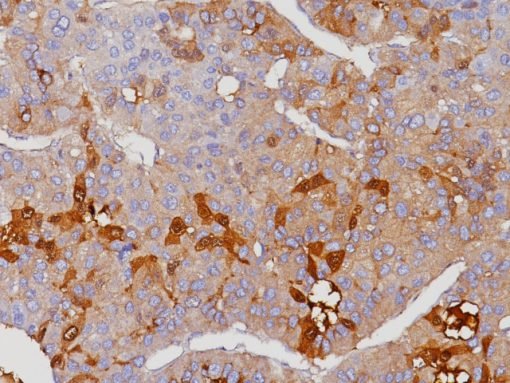Description
CD71 (transferrin receptor), a cell surface proliferation marker, facilitates the cellular absorption of iron. CD71 demonstrates robust membranous and cytoplasmic staining in all erythroid precursors of both normal and dyspoietic bone marrow biopsies. The expression of CD71 diminishes as erythrocytes mature. The peak level is observed in early forms, whereas the lowest amount occurs in the late normoblast stage. Mature erythrocytes notably lack CD71 expression, hence facilitating bone marrow investigations. In comparison to other biomarkers for erythroid precursors, such as hemoglobin or CD235a (glycophorin A), CD71 exhibited the highest specificity in staining, characterized by clear and distinct patterns, and did not label adult red blood cells. CD71 was positive in all instances of parvovirus and acute erythroleukemia, in contrast to glycophorin A and hemoglobin A. CD71 did not exhibit staining in benign lymphoid infiltrates or low-grade lymphomas affecting the marrow. CD71 may thus serve as a dependable erythroid marker in bone marrow. Furthermore, CD71 was demonstrated to be significantly expressed in invasive breast cancer exhibiting acquired resistance to tamoxifen. Extensive CD71 staining was correlated with unfavorable outcome in ER+/luminal-like breast cancer.
Specifications
| Intended Use | RUO |
|---|---|
| Format | Concentrate, Predilute |
| Volume | 0.1 ml, 0.5 ml, 6.0 ml |
| Source | Mouse Monoclonal |
| Species Reactivity | Human; others not tested |
| Clone | H68.4 |
| Antigen | CD71 |
| Isotype | IgG1 |
| Localization | Cell membrane, Cytoplasm |
| Positive Control | Bone marrow |






